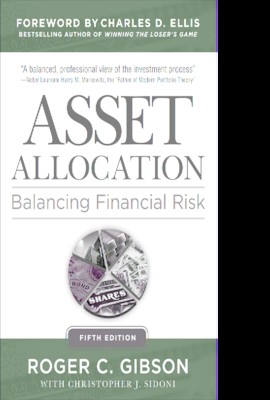
- We will send in 10–14 business days.
- Author: Gibson
- Publisher: McGraw-Hill Companies
- ISBN-10: 1265801975
- ISBN-13: 9781265801977
- Format: 15.2 x 22.9 x 2.3 cm, minkšti viršeliai
- Language: English
- SAVE -10% with code: EXTRA
Reviews
Description
Investors long to beat the market, and money managers accept that as their mandate. The sad reality is that most money managers underperform the market, and individual investors do even worse. Investors also face emotional challenges. The irrational exuberance of the 1990s, for instance, can as easily derail a sensible investment strategy as the market panic accompanying the Global Financial Crisis. Since Roger Gibson wrote the first edition of this book over 25 years ago, his multiple-assetclass investment approach has given investors a disciplined strategy for mitigating risks and realizing their financial goals through widely varying market environments. Grounded in the principles of modern portfolio theory, this fi fth edition of his investing classic explains how and why asset allocation works. Gibson demonstrates how adding new asset classes to a portfolio improves its risk-adjusted returns and how strategic asset allocation uses, rather than fights, the forces of the capital markets to achieve fi nancial success. New topics in this edition
EXTRA 10 % discount with code: EXTRA
The promotion ends in 21d.17:26:40
The discount code is valid when purchasing from 10 €. Discounts do not stack.
- Author: Gibson
- Publisher: McGraw-Hill Companies
- ISBN-10: 1265801975
- ISBN-13: 9781265801977
- Format: 15.2 x 22.9 x 2.3 cm, minkšti viršeliai
- Language: English English
Investors long to beat the market, and money managers accept that as their mandate. The sad reality is that most money managers underperform the market, and individual investors do even worse. Investors also face emotional challenges. The irrational exuberance of the 1990s, for instance, can as easily derail a sensible investment strategy as the market panic accompanying the Global Financial Crisis. Since Roger Gibson wrote the first edition of this book over 25 years ago, his multiple-assetclass investment approach has given investors a disciplined strategy for mitigating risks and realizing their financial goals through widely varying market environments. Grounded in the principles of modern portfolio theory, this fi fth edition of his investing classic explains how and why asset allocation works. Gibson demonstrates how adding new asset classes to a portfolio improves its risk-adjusted returns and how strategic asset allocation uses, rather than fights, the forces of the capital markets to achieve fi nancial success. New topics in this edition


Reviews